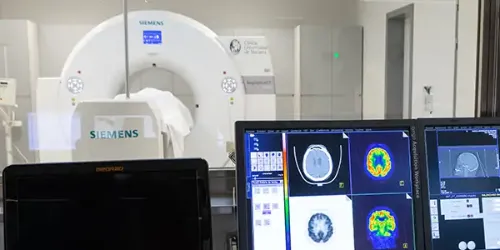Dementia with Lewy bodies
"The assessment by an expert professional is essential to correctly guide the diagnosis and avoid treatments that could worsen the symptoms".
DR. ADOLFO JIMÉNEZ
SPECIALIST. NEUROLOGY DEPARTMENT

Dementia with Lewy bodies is the second most common cause of degenerative dementia, after Alzheimer's disease.
It is characterized by abnormal brain deposition of alpha-synuclein protein, which forms aggregates known as Lewy bodies. Lewy bodies are not exclusive to this disease but can also be found in Parkinson's disease.
In the early stages, the symptoms of Lewy body dementia can be very mild and overlap with those of other diseases, such as Alzheimer's or Parkinson's disease.
Therefore, the evaluation by an expert professional is essential to correctly guide the diagnosis and avoid treatments that could worsen the symptoms.

What are the symptoms of dementia with Lewy bodies?
Patients with dementia due to Lewy bodies may present:
- Memory lapses for recent events.
- Spatial disorientation.
- Fluctuations in the level of alertness: It is common for there to be transient episodes of greater confusion that can fluctuate throughout the day or from one day to the next.
- Visual Hallucinations: Patients may see animals, people or things that do not really exist.
- Parkinsonian symptoms: slow movement, stiffness, tremor and/or slow walking, with shuffling of the feet while walking.
- Sleep disturbances: the person talks, screams or makes movements with his arms as if he were "living" the dream. This alteration is known as REM sleep behavior disorder and can appear several years before the rest of the typical symptoms of the disease. TCSREM is not exclusive to this entity, and it can also occur in Parkinson's disease.
Some patients may also present other manifestations, such as autonomic disorders (orthostatic or postural hypotension, urinary incontinence and constipation), delusional ideas or depressive symptoms.
Do you have any of these symptoms?
You may have dementia with Lewy bodies
How is dementia with Lewy bodies diagnosed?

The diagnosis of dementia by Lewy bodies is based on the data obtained in the anamnesis, the neurological exploration and the neuropsychological evaluation.
The use of complementary tests such as cerebral magnetic resonance, PET-FDG and PET with fluorodopa, is useful to rule out other causes of dementia or parkinsonsimo and to obtain a greater diagnostic certainty.
On occasion, a polysomnography sleep study may also be indicated to determine whether or not the person has a REM sleep behavior disorder.
How is dementia with Lewy bodies treated?
Currently, there are no curative treatments available for dementia with Lewy bodies. However, there are symptomatic drugs aimed at compensating the loss of neurotransmitters in the brain such as levodopa that can improve parkinsonian signs or acetylcholinesterase inhibitors, which improve cognitive alterations and hallucinations.
In Lewy body dementia it is important to avoid the use of certain drugs, such as neuroleptics, which because of their counteracting action levodopa can aggravate parkinsonian signs.
On the other hand, cognitive stimulation therapy is beneficial. In our center, we have a personalized cognitive rehabilitation program for each patient that aims to improve and enhance cognitive abilities.
The Department of Neurology
of the Clínica Universidad de Navarra
The Neurology Department has extensive experience in the diagnosis and multidisciplinary treatment of neurological diseases.
We offer a diagnosis in less than 72 hours, along with a proposal for personalized treatment and post-consultation follow-up of the patient by our specialized nursing team.
We have the most advanced technology for an accurate diagnosis with cutting-edge equipment such as HIFU, deep brain stimulation devices, video EEG, PET and epilepsy surgery, among others.

Why at the Clinica?
- State-of-the-art diagnostic assistance with great work in research and teaching.
- Specialized nursing team.
- We work together with the Sleep Unit.

















